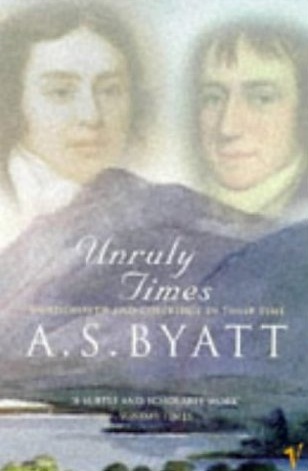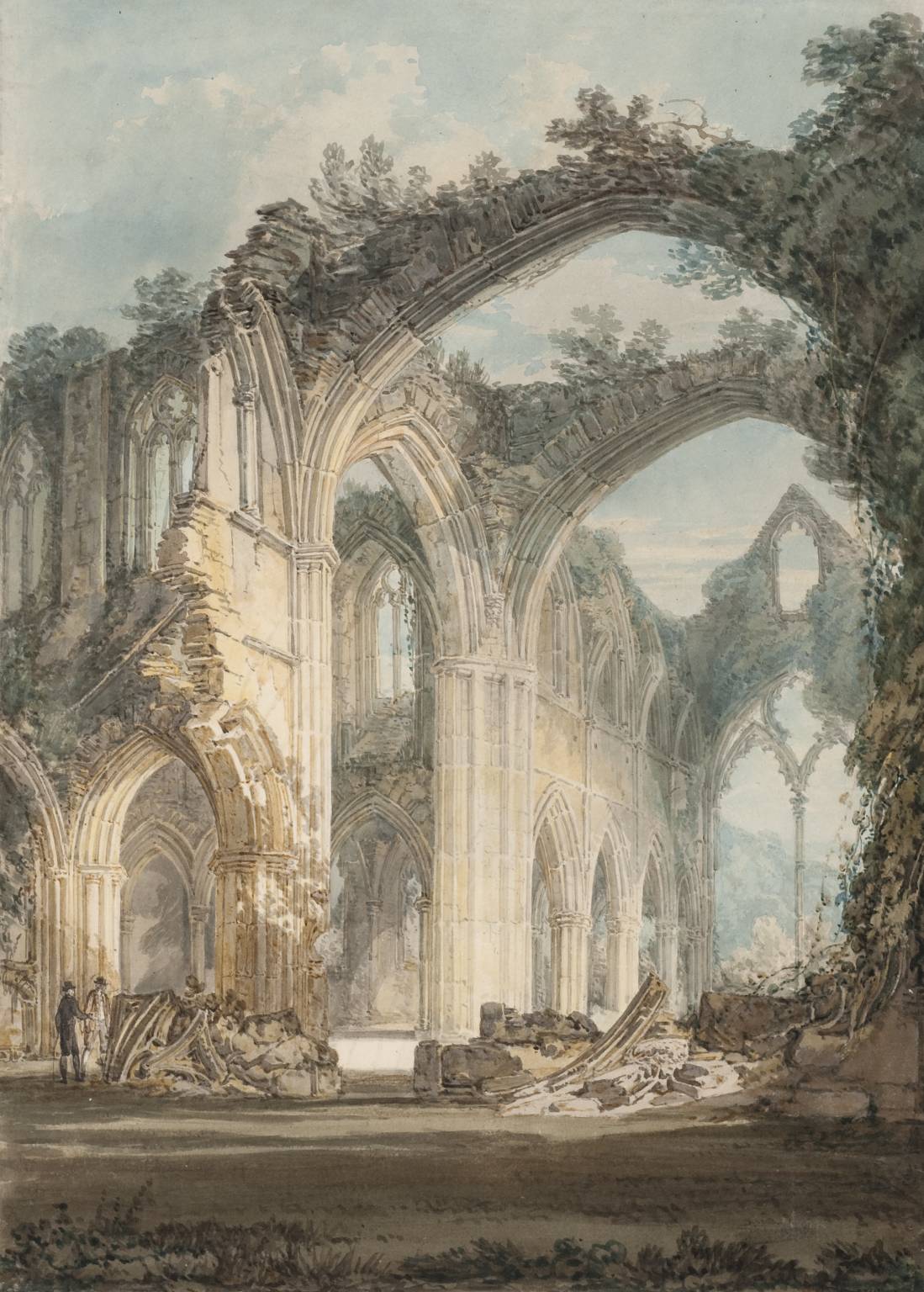Unruly Times by A. S. Byatt (Book Review)

Just a few years before Europe was plunged into the decade long fighting of the Napoleonic Wars a collection of poems simply titled Lyrical Ballads was published in 1798 by William Wordsworth and Samuel Taylor Coleridge. In contrast to the baroque style of 18th century, the Ballads provided poetry with a breath of fresh air by using a simple and breezy language written in a diction that could be understood by the common man as well as writing about subject matter than could be appreciated by any class. This worked marked by the beginning of the Romantic period in English verse, which in turn produced some of the most well known poets of the English language (Blake, Byron, Shelley, and Keats in addition to Wordsworth and Coleridge). The term “fresh air” is appropriate in more way than one as the Ballads marked a shift away from poems about kings, queens, and epic battles in history towards the subjects of nature: birds and trees, flowers and the elemental forces. Just as the Impressionists found that they could better capture the spirit of the scene by painting en plein air, having grown up in the Lake District, Wordsworth’s poetical muse was to be found in the “steep woods and lofty cliffs” of North West England.
How did this paradigm shift in poetry occur? What were the influences and situations that propelled Wordsworth and Coleridge to this new height of artistic achievement? A. S. Byatt’s Unruly Times: Wordsworth and Coleridge in Their Time provides a masterly study of the key forces and contexts of these two men. Clearly a lover poetry and a writer herself, Byatt manages to give a fair portrait of both men, excusing some of their foibles whilst highlighting some of the their failings. I particularly enjoyed the structure of the book, with each chapter being a self-contained vignette on some topic pertinent to the artists’ lives and art such as Daily Life, The Structure of Society, Political Views, Education and Childhood, The Literary World, and The Landscape.
I often found myself, when reading this book, feeling more sympathetic for Coleridge but (annoyingly) seeing my own personality more aligned with Wordsworth.
Wordsworth the young man was on the whole solitary, painfully proud, self-critical and self-suspecting. His letters and other writings have an overwhelming tone of high moral idealism and high poetic purpose, sometimes conflicting. He meant, even then, to be great, and nothing but the best would do, but the circumstances of his life–poverty, lack of family security, lack of practical vocation, responsibility to Annette[1]–left him in doubt about when he would achieve or how he would achieve it.
Like so many young men, Wordsworth found his unrealistically high ideals far outstripping his intellectual and moral capabilities to satisfy his internal spectator. While many members of his family came from money, and Wordsworth was undoubtedly in modern parlance a “one percenter”, in a time before a reliable banking system, wealth management, and the ever-present prospect of a European military conflagration even those at the top experienced financial uncertainty.
“It is impossible you can ever have your father’s consent to a scheme which to a parent at least, if not to everyone else, must appear wild even to insanity. It is an observation to whose truth I have long since consented that small certainties are the bane of great talents.”
One unshakable pillar in Wordsworth’s personal life was his sister Dorothy. To put it in poetic terms, she was his sun, moon and stars – his everything. Her posthumously published letters have provided historians and artists with an extremely rich and intimate portrait of both Wordsworth the man and their relationship. It should be noted that after Wordsworth married Mary Hutchinson, Dorothy continued to live with her brother until his death. She was the most powerful influence on Wordsworth throughout his life, and acted as a second conscience. In contrast, Coleridge had no such personal crutch.
He was the youngest of nine brothers, the son of an impractical literary clergyman and an ambitious mother. As a little boy he was precocious and clever, which produced in him an anxious desire to display his learning and be admired, and a deeper fear of not living up to what was expected of him. He seems to have been afraid of his brothers, with whom he never managed to be on easy terms–he spent his life alternately shocking them, apologizing abjectly and profusely, and making grandiose gestures and plans to impress them with his seriousness. He describes the child he was with a mixture of self-mockery, self-contempt and showing off which became habitual with him.
Like Wordsworth, Coleridge was a republican and an idealist in his youth,[2] and was taken in with the Utopian ideals of Robert Southey at Cambridge (the third triumvir of the Lake Poets) who sought to establish an egalitarian colony on the banks of the Susquehanna river. His beau at the time, Mary Evans, wrote to him: “[A]n Eagerness in your Nature which is every hurrying you into a sad extreme” well captures his temperament towards such projects. Luckily for all the persons involved the scheme did not come to fruition but Coleridge would be tied to the Southey clan by a somewhat-forced marriage to his sister Sara. They were not a suitable match. Coleridge knew this on some level, and had to be dragged from London by Southey himself to the wedding aisle to prevent a minor scandal from ensuing. Sara had neither the artistic sympathies that Dorothy or Mary possessed nor the simple tastes that would have somewhat relieved Coleridge from some of his financial stresses.
While we know Coleridge as a poet today, in his life he viewed himself more as a general intellectual and a amateur poet.[3] He wrote on other topics, including as (perhaps surprisingly to modern readers) On the constitution of the Church and State. He found it hard to channel his intellectual powers in a productive way throughout his life. He was, if anything at least, self aware of his failings:
Hamlet’s character is the prevalence of the abstracting and generalizing habit over the practical. He does not want courage, skill, will or opportunity; but every incident sets him thinking; and it is curious and at the same time strictly natural, that Hamlet, who all the play seems reason itself, should be impelled, at last by mere accident to effect his object. I have a smack of Hamlet in myself if I may say so.
The England of first half of the 18th century was a rapidly changing one due to forces of the industrial revolution and political reforms. While their personal lives were largely unaffected, both men saw the landscape of England evolving as vast stretches of open fields became enclosed upon (i.e. assigned to private landholders) and factories began to dot the landscape.
Coalbrookdale by Night

While both men’s political views shifted after the catastrophes of the French Revolution towards being solidly Tory, Wordsworth became the far more reactionary of the two. While not noted by Byatt, the the political differences between the two men can still be seen in the divide in the modern conservative party (the City vs the Shires). Conservative opinion is largely sympathetic to the capitalist system and the business class, but the accompanying social changes that economic currents often bring causes a natural tension to a school of thought which is largely about maintaining the existing social order.
Coleridge, in fact, was not as Wordsworth pictured him … [H]e enjoyed city life and was peculiarly able to cope with the academic education system, wince he was extremely gifted and much more excited by pure ideas–geometric, linguistic, philosophic–than Wordsworth would ever be.
The industrial revolution and expansion of democratic privileges in Britain in the 19th century was more concerning to Wordsworth, who was simultaneously upset by the plight of the poor as well as their growing political influence as manifested through the “mob”. The former sentiment is well-echoed in the well-known sonnet:
The world is too much with us: late and soon
Getting and spending we lay waste our powers:
Little we see in Nature that is ours;
Whereas the latter can be seen in this statement from 1832:
If the democratic Spirit be organized in Legislation to the extent now wished for, and aimed at by many, the pecuniary value of every thing in the world of Taste will sink accordingly; and its intellectual estimation will also erelong be proportionately affected. Men will have neither time, tranquility, or disposition to think about any such thing.
There is something ironic, and perhaps even hypocritical, that Wordsworth believed democratic forces would cheapen the value of the art given that Lyrical Ballads was the most democratic of all poetic verses since the time of Chaucer. I can imagine Wordsworth saying something along the lines of Sir Humphrey:
This is a British democracy Bernard. British democracy recognizes that you need a system to protect the important things of life and keep them out of the hands of the barbarians. Things like the Opera, Radio 3, the country side, the law, the universities–both of them–and we are that system.
Both men’s political conversion was strongly influenced by Edmund Burke, who is now considered to be the philosophical founder of modern conservatism. Burke’s consistent application of his political philosophy allowed him to give support to the American revolution whilst decrying the subsequent French one. He realized that the former was based on a desire to obtain the liberties that English subjects should naturally hold whilst the latter was based on the mistaken belief that by extirpating the existing social hierarchy society could be reformed in a way beneficial to mankind. His Reflections on the Revolution in France poured cold water on the heady optimism of the republicans to which Wordsworth and Coleridge belonged to in their youth. Coleridge excellently summarizes Burke’s “capacity to understand the general laws of human behavior”:
Edmund Burke possessed and had sedulously sharpened that eye which sees all things, actions and events in relation to the laws that determine their existence and circumscribe their possibility. He referred habitually to principles. He was a scientific statesman; and therefore a seer. For every principle contains in itself the germs of a prophecy; and as the prophetic power is the essential privilege of science, so the fulfillment of its oracles supplies the outward and (to men in general) the only test of its claim to the title. Wearisome as Burke’s refinements appeared to his parliamentary auditors, yet the cultivated classes throughout Europe have reason to be thankful that he went of refining and thought of convincing while they thought of dining.
One area in which both men were and remained progressive throughout their life was in the education of children. Both had experienced and thought terrible the way in which education was a brutalizing experience for most students. Jean-Jacques Rousseau’s Emile had a disproportionate effect on the thinking of Men of Feeling towards the subject of education and how this formative experience could create the ideal and humane citizen.
Coleridge’s notebooks make it clear that he was a precise and loving observer of his own children’s development. He believed children should be happy–his own childhood anxieties had left marks on his character which he associated with his adult failures and illnesses.
The English romantic poets are by far best known for their writings on nature. But the very idea of what was worth capturing about in nature was undergoing substantial changes in early 19th century. Rousseau had famously praised the more chaotic English garden over the overwrought French one. Perhaps surprisingly, Burke plays an important role yet again with his views on what makes something sublime as outlined in his treatise On the Sublime and the Beautiful from 1756.
One of Burke’s most important contributions to the discussion of aesthetic emotion was his analysis of why terrifying, infinite, or empty things were attractive to the human mind. He ascribed some of the sense of the sublime to a sense of real power or danger faced without damage.
There were seven listed attributes of the sublime according to Burke: (1) Obscurity (which induced terror), (2) Power, (3) Privations (Vacuity, Darkness, Solitude, Silence), (4) Vastness (height and depth), (5) Infinity (a tendency to fill the mind with that sort of delightful Horror), (6) Succession (an endless progress beyond limits), and (7) Uniformity (a round and therefore artificially endless church). Wordsworth saw the sublime aspect of the Alps during his walking tours there:
… the immeasurable height
Of woods decaying, never to be decayed,
The stationary blasts of waterfalls,
And in the narrow rent at every turn
Winds thwarting winds, bewildered and forlorn,
The torrents shooting from the clear blue sky,
The rocks that muttered close upon our ears,
Black drizzling crags that spake by the way-side
As if a voice were in them, the sick sight
And giddy prospect of the raving stream,
The unfettered clouds and region of the Heavens,
Tumult and peace, the darkness and the light–
Were all like workings of one mind the features
Of the same face, blossoms upon one tree;
Characters of the great Apocalypse,
The types and symbols of Eternity,
Of first and last and midst and without end.
In addition to the idea of the sublime, the idea of what made something Picturesque was also being debated. Was there not something picturesque about the ruins of Tintern Abbey? With its
Ivy, in masses uncommonly large, has taken possession of many parts of the walls; and gives a happy contrast to the grey-coloured stone… Nor is this undecorated. Mosses of various hues, with lichens, maiden hair, penny-leaf and other humble plants, overspread the surface… all together they give those full-blown tints which add the richest finishing to a ruin.
Ruins of Tintern Abbey

While being a strong support of the Church of England and a thorough Anglican, Byatt points out that some of Wordsworth’s language when applied to the descriptions of nature strike one as being pantheistic: “something far more deeply interfused/Whose dwelling is the light of setting suns/And the round ocean and the living air/And the blue sky and in the mind of man”. As Ross Douthat has pointed out, even those individuals in the West who describe themselves as Christian, are often practicing a watered-down Eat, Pray Love or Oprah form of worship. The enduring popularity of the English Romantic poets must be in no small part to their intimate relationships to Nature. There is little opposition from almost quarters today that a strong relationship with the natural world is both desirable and healthy. While the forces that the Romantics were reacting to (capitalism, the industrial revolution, etc) now seen to us inevitable (and hopefully desirable), there a lingering distrust of the technological changes that continues to draw us back to the beauty of Daffodils and romantic reveries of Kubla Khan.
Notes
-
Initially an idealistic republican in early life, Wordsworth traveled to France to participate in the French revolution. He had a relationship with Annette Vallon in 1792 who gave birth to their daughter Caroline that year. Wordsworth’s conduct towards Annette could not be described as gentlemanly, but unlike some deadbeats he did manage to send £30 a year for Caroline’s support. ↩
-
Albeit a small sample size, but Francois Guisot’s quote does seem remarkably germane: “Not to be a republican at twenty is proof of want of heart; to be one at thirty is proof of want of head”. ↩
-
It might be fairer to say that Coleridge had hoped to be a poet but by the end of his life had acknowledged he had not been a full-fledged one due to his limited output (especially in comparison to Wordsworth). One feels sorry for Coleridge in this respect because modern readers of poetry treasure his seminal works as some of the most important in the canon. ↩
